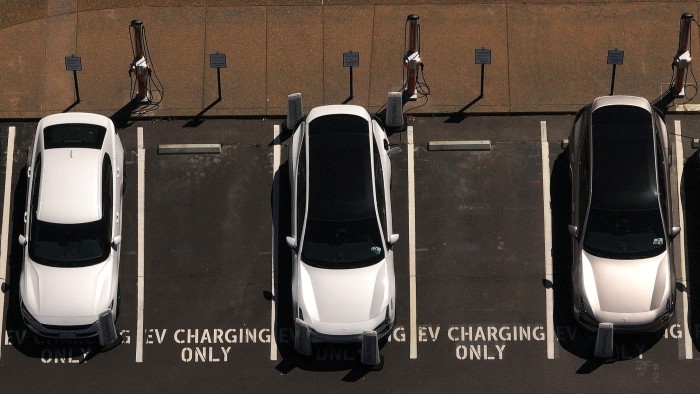Unlock the White House Watch newsletter for free
Your guide to what Trump’s second term means for Washington, business and the world
At least the Soviet Union only produced one “Sputnik moment”, when the launch of its orbiting satellite in 1957 administered a galvanising shock to the US scientific and defence establishment. America’s current superpower rival, China, is claiming them on a regular basis, the launch of the DeepSeek AI large language models being one among several. But for an array of green technologies, notably batteries and electric vehicles, the US seems content to shrug and let China win.
The green spending in Joe Biden’s Inflation Reduction Act (IRA), which expanded federal spending and tax credits for technologies including hydrogen, solar and wind power and clean fuel production had two goals. One was to get Biden re-elected by creating jobs, the second to challenge Chinese supremacy and establish US autonomy in green tech. It failed on the first, and its initial gains on the second are in severe jeopardy.
By creating jobs in Republican-voting states and congressional districts, the IRA was designed to be Trump-proof, and it did cause a jump in investment in sectors like batteries and electric vehicles. But in practice ideology is now winning over economic pragmatism, with environmental principles barely even in the game.
The green spending is up for grabs in Donald Trump’s “one big beautiful bill”, currently bouncing around Capitol Hill. The House of Representatives wanted an end to clean-energy tax credits; the Senate wants to maintain them for everything except wind and solar. There’s also a potential wrecker in the form of a clause that denies any kind of tax credit to companies with Chinese components in their supply chains, however small.
Whatever finally emerges, it’s clear that the tax credits for purchasing EVs have few friends in the White House. Republicans often say that only coastal elites buy them, and hence they don’t need subsidising. At the high prices US EVs sell at, there’s some truth in that. It’s a long-standing weakness in the US green transition that the insistence on producing the goods at home makes them expensive. Protecting the domestic industry with tariffs may be politically necessary to get products like solar panels subsidised and sold at all, but it is clearly a constraint in getting them adopted.
Many in Congress dislike China and EVs more than they like technological advance. In an act of pure spite, the Senate recently attempted to stop the US Postal Service from using new state-of-the-art electric delivery trucks — a move that fortunately failed on a technicality.
The US’s record in squandering leads in green technology is now becoming embarrassing. Scientists at the University of Texas invented the lithium-iron-phosphate battery, which is becoming a standard for EVs, in 1996, but the US ceded the commercial advantage to Chinese companies, which were supported by lavish state subsidies. Elon Musk’s Tesla had a great start in EVs, but until very recently Musk actually opposed the US tax credits because they would have helped his competitors. He preferred consolidating his position in the US market to expanding it.
No rich-country car company except Tesla saw the EV revolution coming and got to the front of it the way China did. But at least European producers like Volkswagen have done their best to catch up with the help of official subsidies combined with temporary and calibrated EU anti-subsidy duties on imports. By contrast, the indigenous American manufacturers, which have for decades skulked behind the US 25 per cent tariff on pick-up trucks, have apparently forgotten how to innovate outside that part of the market.
Despite (or because of) being protected by 100 per cent tariffs on EVs imposed by Biden, Detroit has been slow to expand production and develop budget models. The US EV market remains much smaller than the EU one, let alone China, which will soon sell more EVs than the US sells all cars put together. In the meantime, tariff uncertainty is putting much battery and EV production on hold. The REPEAT Project at Princeton University, which evaluates federal energy and climate policy, says that withdrawing the credits will cause huge overcapacity in the US battery and EV market.
If you had to design an example of how interlocking political and economic pathologies among policymakers were weakening the US from within, its decision to give up on supporting the green transition and particularly EVs and batteries would be a great one. Climate change denial, mindless prejudice against a perceived elite, a nuance-free abhorrence of China and an addiction to protectionism have squandered its technological advantage.
The Sputnik satellite fired up US enthusiasm for scientific advance: 12 years later, an American walked on the moon. If Trump and the current Congress had been in charge back then, they would presumably have decided to let the Soviets do space exploration and concentrated instead on building jumbo jets and big cars with fins.
It’s hard to see how the trend away from green tech will get reversed as long as Trump is in the White House and the Republicans occupy both houses of Congress. It’s an incredible own goal, rivalling Brexit in self-destructive folly, and the impact will reverberate for many years to come.



